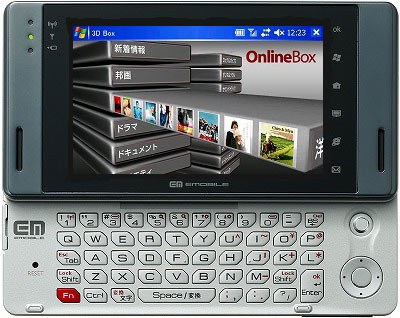 eMobile announced their debut package offering – complete with terminals, data cards and flat-rate HSDPA price plan – today at a Tokyo press conference with company representatives joined by notable industry partners including Paul Jacobs, CEO of Qualcomm, Darren Huston, CEO of Microsoft Japan, and Masafumi Matsumoto, representative director from Sharp. The upstart carrier’s founder, chairman and CEO, Sachio Semmoto (who was co-founder of DDI, which became KDDI), called their newly introduced Sharp EM-One smartphone, “the next-generation mobile broadband device” – which was “designed to deliver always-on broadband at a reasonable monthly flat-rate price.”
eMobile announced their debut package offering – complete with terminals, data cards and flat-rate HSDPA price plan – today at a Tokyo press conference with company representatives joined by notable industry partners including Paul Jacobs, CEO of Qualcomm, Darren Huston, CEO of Microsoft Japan, and Masafumi Matsumoto, representative director from Sharp. The upstart carrier’s founder, chairman and CEO, Sachio Semmoto (who was co-founder of DDI, which became KDDI), called their newly introduced Sharp EM-One smartphone, “the next-generation mobile broadband device” – which was “designed to deliver always-on broadband at a reasonable monthly flat-rate price.”
The new Sharp terminal is bound to be popular with the same crowd who lined-up to get Willcom’s Zero3 model, also made by Sharp, in late 2005. The EM-One is a touch-screen qwerty-keyboard dual-slider device sporting a 4-inch LCD screen with Japan’s first WVGA (800×480)-resolution screen and Windows Mobile 5.0 (with all the typical office functions). At only 18mm thin, it even comes ready to watch 1Seg digital TV broadcasts and – according to the specs – the unit sports a Marvell PXA270 cpu running at 520MHz with 512MB of Flash memory and 128MB RAM. Perhaps most interesting are the rather agressive price plans, which bundle the device with fixed- and mobile-broadband connection services to attract new customers.
The company also announced four new data cards including a PC Card unit produced by NEC and a USB design coming from Huawei, which will run on the same high-speed network and tabehoudai all-you-can-eat billing model. The new services will be available starting 31 March in five major population areas including Tokyo, Aichi, Osaka and Kyoto. More details after the jump.


 eMobile announced their debut package offering – complete with terminals, data cards and flat-rate HSDPA price plan – today at a Tokyo press conference with company representatives joined by notable industry partners including Paul Jacobs, CEO of Qualcomm, Darren Huston, CEO of Microsoft Japan, and Masafumi Matsumoto, representative director from Sharp. The upstart carrier’s founder, chairman and CEO, Sachio Semmoto (who was co-founder of DDI, which became KDDI), called their newly introduced Sharp EM-One smartphone, “the next-generation mobile broadband device” – which was “designed to deliver always-on broadband at a reasonable monthly flat-rate price.”
eMobile announced their debut package offering – complete with terminals, data cards and flat-rate HSDPA price plan – today at a Tokyo press conference with company representatives joined by notable industry partners including Paul Jacobs, CEO of Qualcomm, Darren Huston, CEO of Microsoft Japan, and Masafumi Matsumoto, representative director from Sharp. The upstart carrier’s founder, chairman and CEO, Sachio Semmoto (who was co-founder of DDI, which became KDDI), called their newly introduced Sharp EM-One smartphone, “the next-generation mobile broadband device” – which was “designed to deliver always-on broadband at a reasonable monthly flat-rate price.”